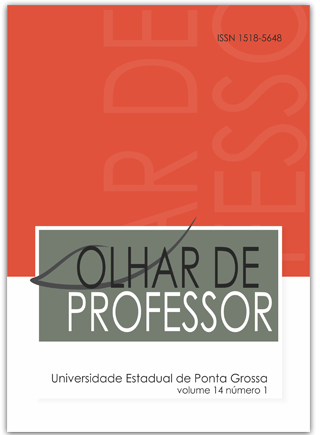Educação e mídias: uma relação delicada Doi: 10.5212/OlharProfr.v.14i1.0001
Conteúdo do artigo principal
Resumo
Este artigo é resultado de pesquisa desenvolvida junto a professoras da Rede Pública de Ensino das cidades de Natal e Macaíba/RN. A pesquisa enfocou o lugar do estudo das mídias na formação de professores numa perspectiva emancipatória. Foi realizada seguindo uma metodologia multirreferencial, e abordou essa temática na perspectiva da compreensão de como esse lugar está posto no cenário educacional brasileiro e quais elementos estão interferindo para a delimitação de suas fronteiras. Um dos temas que emergiram durante a pesquisa foi o das diferentes formas de referir as mídias no contexto educacional – recursos didáticos, recursos audiovisuais, meios de comunicação mídias, tecnologias educacionais, tecnologias de comunicação e educação. O que vamos discutir neste artigo é que cada uma dessas denominações carrega em si uma concepção de educação que contribui para uma relação mais (ou menos) emancipatória com as mídias.
Downloads
Detalhes do artigo
Autores que publicam nesta revista concordam com os seguintes termos:
a) Os autores mantêm os direitos autorais e concedem à revista o direito de primeira publicação, com o trabalho simultaneamente licenciado sob a Creative Commons Attribution License Atribuição 4.0 Internacional (CC BY 4.0) que permite o compartilhamento do trabalho com reconhecimento da sua autoria e publicação inicial nesta revista.
b) Os autores são autorizados a assinarem contratos adicionais, separadamente, para distribuição não exclusiva da versão publicada nesta revista (por exemplo, em repositórios institucionais ou capítulos de livros), com reconhecimento da sua autoria e publicação inicial nesta revista).
c) Os autores são estimulados a publicar e distribuir a versão onlline do artigo (por exemplo, em repositórios institucionais ou em sua página pessoal), considerando que isso pode gerar alterações produtivas, bem como aumentar o impacto e as citações do artigo publicado.
d) Esta revista proporciona acesso público a todo o seu conteúdo, uma vez que isso permite uma maior visibilidade e alcance dos artigos e resenhas publicados. Para maiores informações sobre esta abordagem, visite Public Knowledge Project, projeto que desenvolveu este sistema para melhorar a qualidade acadêmica e pública da pesquisa, distribuindo o OJS assim como outros softwares de apoio ao sistema de publicação de acesso público a fontes acadêmicas.
e) Os nomes e endereços de e-mail neste site serão usados exclusivamente para os propósitos da revista, não estando disponíveis para outros fins.
______________

Este obra está licenciado com uma Licença Creative Commons Atribuição 4.0 Internacional.





